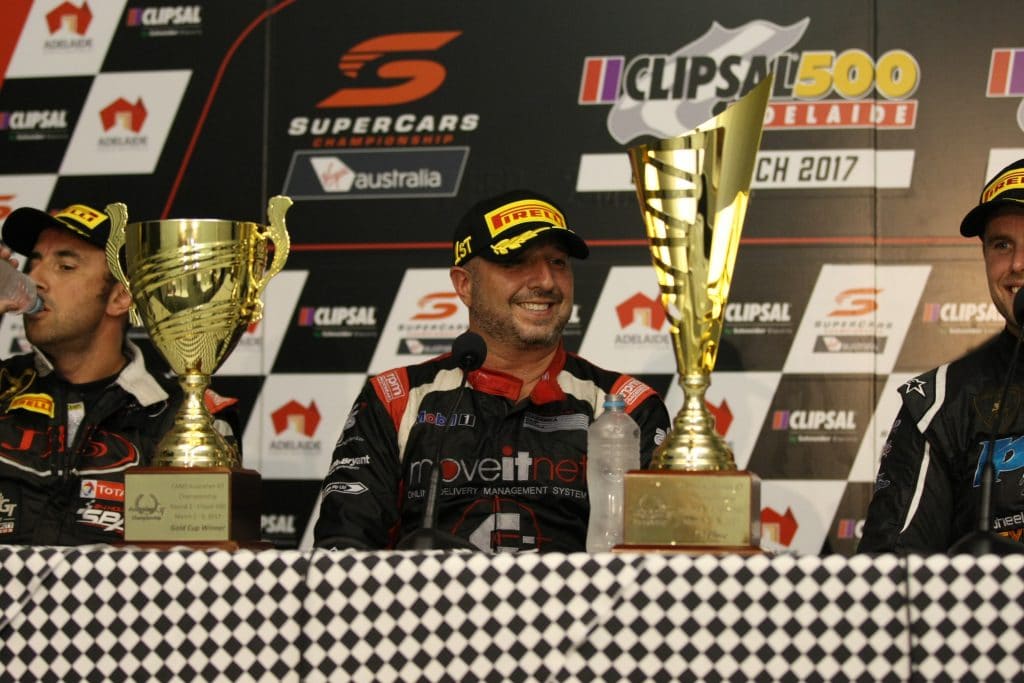Australian GT Championship and Formula Ford; two categories holding the first round of their national series on the weekend (GTs – Clipsal 500, Formula Ford – Sandown) , two categories with competitor bases at polar opposite ends of the spectrum (GTs – gentleman drivers with an average age of about 45, Formula Ford – aspiring young professional racers with an average age well below 20) and two categories in which I have a professional interest (GTs – doing media for Tony Bates, Formula Ford – doing PR, commentary and assisting with category management).
Overall, both categories enjoyed positive weekends; Formula Ford had a grid of more than 30 cars and the GTs put on terrific racing with Bates claiming the round victory.
It’s Bates’ GT success I want to focus on here, as a case study to reinforce my broader argument for why “gentlemen drivers” deserve more recognition and more credit when they achieve first-class results.
You see, unfortunately there is a perception and an attitude among some people in the motorsport community that wealthy individuals who go motor-racing for recreation are somehow inferior to professional Supercar racers or even the young kids in Formula Ford.
Comments I often hear are along the lines of “that driver is only racing in the GT Championship because he has a lot of money, isn’t it a shame there isn’t a more talented driver in the car,” or similar phrases to that effect. And I couldn’t disagree more strongly.
Keep in mind that those who make a professional career out of motorsport have started at a very young age, and in most cases had a lot of support from their family to help them make it to stardom.
What about those who haven’t been fortunate enough to have that kind of family backing? Let’s go back to the Tony Bates example.
Batesy is the epitome of the self-made entrepreneur. Coming from humble beginnings, he saw an opportunity in the marketplace to provide freight logistics management services, and so his company, Alternative Freight Services, was born in 1995.
Through sheer hard work, AFS grew into an operation that allowed Tony to become involved in motorsport in the early 2000s, through the Commodore Cup national series.
Because he hadn’t started racing until he was in his 30s, Tony didn’t have the car control or racing instincts ingrained into those who started at a much earlier age, and so the learning curve was a lot tougher.
Being a full-time business owner, Tony had to fit testing and fitness training around his numerous other commitments. In the Commodore Cup days, I can remember Tony getting out of the car after a session and being on the phone to a client, employee or business associate – hardly the ideal, distraction-free environment for optimising his on-track performance.
And yet, his rise through the ranks can best be described as meteoric – by 2006 he was a regular podium finisher in Commodore Cup, and he progressed to the Development Series in 2008, recording several top 10 finishes against a crop of drivers with vast experience in karts, Formula Ford and other national racing categories.
He returned to Commodore Cup and won races in 2009 and ’10, finishing runner-up in the title race in both those seasons, before returning to DVS in 2011. He progressed to Carrera Cup in 2012, won the Challenge Class title in 2016 and the rest, as they say, is history.
The underlying theme here is that a sustainable occupation as a professional racing car driver is an outcome aspired to by many and achieved by very few – but it’s not the only way to establish a fruitful career in motor racing. As Batesy (and others) have demonstrated, the alternative pathway into motorsport at the top level is to concentrate on being successful off the track.
And let’s face it, the successes of these gentlemen drivers in other walks of life are generally for the benefit of the much wider community. Their business success means they can afford to provide career opportunities to others, while their motorsport exploits create jobs within the industry as well – think mechanics, engineers, panel beaters and so forth.
And with the option of having Pro-ranked co-drivers in the Australian GT Championship, a contingent of either semi-retired or part-time professionals have been given a new lease of life or a foot in the door as well – I’m talking about the likes of Craig Baird, Steve Owen, Dean Canto, Nathan Antunes and Jake Fouracre.
So next time a gentleman driver chalks up a race win in a prominent category, let’s not envy them; instead, let’s acknowledge their contribution to motorsport and to society.




